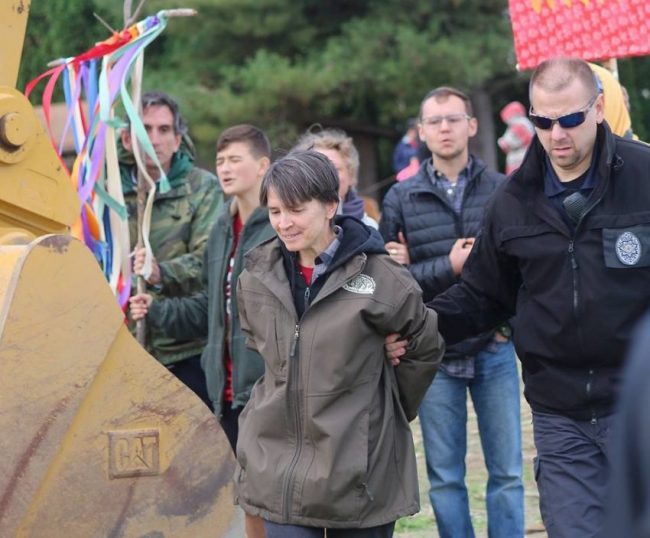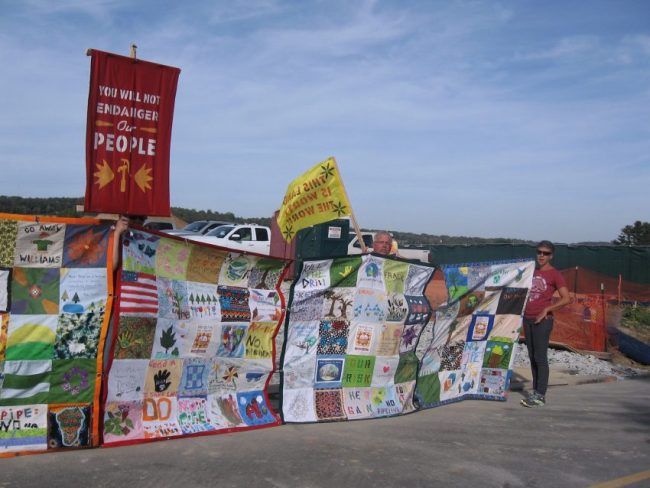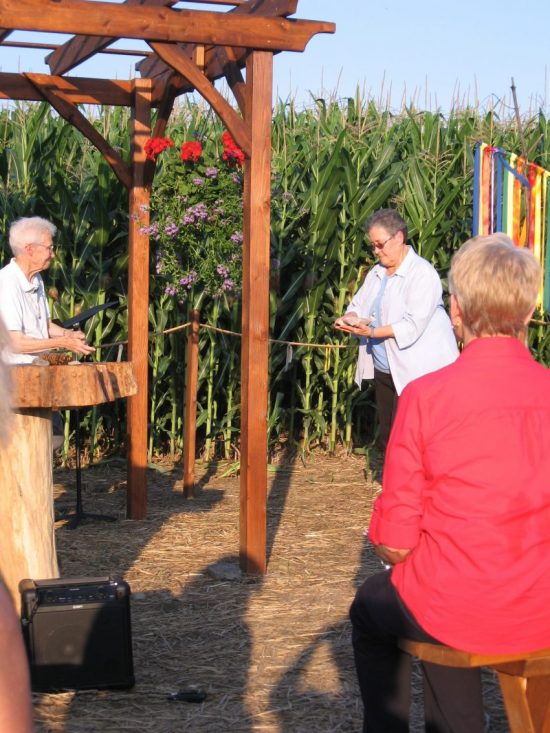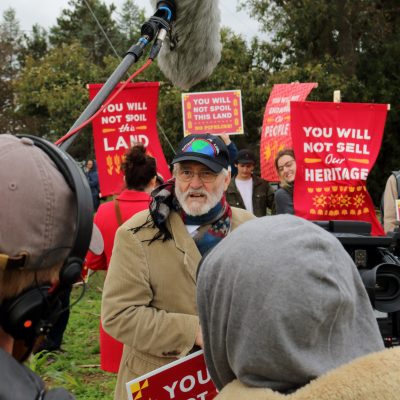by Anne Sensenig
Multiple people from Community Mennonite Church, Lancaster, Pa., have been involved in Lancaster Against Pipelines, an organization resisting the proposed Atlantic Sunrise Pipeline. Among them are the author, below center, Jerry Lee Miller, pictured at left and Malinda Harnish Clatterbuck and Mark Clatterbuck who helped found Lancaster Against Pipelines.

Anne Sensenig participating in nonviolent direct action against the Atlantic Sunrise Pipeline on October 16, Lancaster County, Pa. Anne was arrested, along with the others mentioned above. Photo by David North.
“May the life I lead speak for me.”
This is one of the songs I lead at Lancaster Against Pipelines (LAP) direct actions in opposition to the proposed Atlantic Sunrise Pipeline (ASP) in Eastern Pennsylvania. The lyrics seem pretty Anabaptist. I hope that my action—to join this community of strangers, friends and neighbors united for change in our county, state and even world—will speak for my values.
The path that Williams Partners proposes for their pipeline crosses farms, woodlands, families’ properties and 370 waterways in Lancaster County. Yet it will not benefit Lancaster County since the gas is intended for export. Furthermore, the gas is fracked, and fracking often leaks methane, a potent greenhouse gas, into the atmosphere.
The case against the pipeline also includes the fact that its size—42” in diameter and 1200-1500 PSI—is unprecedented. This increases safety concerns. Pipeline explosions are relatively uncommon, but when they occur they are devastating. Nevertheless, the pipeline has received approval from the Federal Energy Regulatory Commission (FERC) and all the necessary permits to begin construction.
What is galling to me is that Williams Partners already has a working pipeline in place to transport their gas. But they want a bigger, high-pressure short-cut, so more can be moved faster, for the increase of profits. Individual property owners, Lancaster County farmland, recreational areas, flora and fauna are subordinate to out-of-state corporate greed.

The proposed pipeline is 42 inches in diameter. In this action, protesters shared bread with workers and spoke with them about why they objected to the pipeline.
Working through legal means
Since 2014, LAP has engaged in multiple venues to prevent pipeline construction through legal means: letter-writing, visits to local and state decision-makers, attendance at township meetings, submission of written and verbal comment at FERC hearings—including scientific reports documenting the harmful impacts of pipeline construction—and even the filing of several lawsuits.
With every step, one would believe that perhaps this time the volume of opposition, or the evidence from expert reports, or the weight of the law—in essence, the democratic process—would finally turn the tide. But, incredibly, at every level of government, from township to governor to FERC, support went to the industry.
Fast-forward three years: In mid-September 2017, construction started on the ASP—a 200-mile route stretching from the Marcellus Shale drilling region in northeast Pennsylvania to Lancaster County in the southeast. Construction in Lancaster County started in October. Since that time, LAP has staged 5 direct actions at several TransCo/Williams worksites.
Creative, disciplined and nonviolent
LAP’s strategic principles state that, “Our actions will be creative, disciplined and nonviolent.” We have lived up to this commitment at each event. LAP’s values have a lot to do with my attraction to this movement. While not an overtly religious movement, the leadership is principled and grounded. It inspires the same from participants, who come to the cause from a variety of perspectives, including Quaker, Catholic, former Amish, Mennonite and those who don’t identify with a faith tradition.

Lancaster Against Pipelines prepared quilts to convey their message.
Many are outraged by the trampling of individual and community rights by an outside company for private gain. Others worry about personal safety and health, or the loss of personal economic investment. Some oppose the destruction of farmland, preserved land, historic Native American sites, or favorite hiking or fishing spots. Still others are opposed for environmental reasons that include both local and global impacts, such as climate change.
The following are among the direct actions to date:
- building an outdoor chapel in the middle of the proposed pipeline route;
- blocking a huge earth-mover from entering the easement with human bodies;
- entering a worksite to offer prayers of protection for the earth and bread to construction workers during a 10-minute hiatus permitted by police;
- blocking access to a right-of-way with the county-appropriate symbol of a quilt;
- and, inviting pipeline employees to sit down with Lancastrians over pancakes, whoopie pies and oranges to discuss why we oppose this pipeline crossing our land.
A chapel in a cornfield
The outdoor chapel was built in July of 2017 in Columbia, PA, on a cornfield owned by the Adorers of the Blood of Christ, a Catholic order with a strong land ethic. Since then, most of LAP’s focus has been on protecting the Sisters’ property from pipeline construction. LAP has held weekly vigils of prayer, song and reflection outdoors. Hand-built wooden benches, a pergola, a wooden altar and a beribboned cross are part of the site. A string fence decorated by hopes and prayers made visible in the form of tied ribbons encircles the space.

A worship service at a chapel built in the path of the pipeline. Sisters of the Adorers of the Blood of Christ prepare a ritual at an outdoor chapel on their land.
Meanwhile, the Sisters filed a federal civil rights law suit on religious grounds, asking that the pipeline not be built on their property in direct violation of their strongly-held beliefs about creation care. Despite their pending case, courts have refused to issue an injunction on construction until the case can be heard.
In open defiance of the suit, Williams intentionally rushed to start construction precisely on the Sister’s property. The cornfield right-of-way is the only site on the ASP where pipe is on the ground. With work expedited, pipe has been welded and is ready to go underground – with no other construction to connect to on either side of the property.
Putting bodies in the way
With the beginning of construction, the only remaining option for resistance is to physically put bodies on the line—in true non-violent direct-action tradition. On October 16, as the first piece of equipment rolled up to the edge of the Adorers’ cornfield, pipeline opponents stepped onto the easement to block its path. Eventually, 23 were arrested, including an 86-year-old and a 16-year-old. I was one of the “Chapel 23.”
The following Saturday, the “Quilt 6” were arrested at the far end of the right-of-way. Previously, eight Lancaster County residents were arrested in January 2017 at a test-drilling site in Conestoga Township, contending that Williams didn’t have permission to drill. At the preliminary hearing scheduled for December 4, 2017, some of the Chapel 23 will claim their right to a hearing before a jury, to bring more public awareness to the issue.
While each action brings only a brief reprieve from construction, we continue to take a stand: to buy time, focus public attention and create space for future action. On November 6, we received the encouraging news that an emergency motion filed by the Allegheny Defense Project, Sierra Club, Lebanon Pipeline Awareness, LAP and others resulted in a temporary emergency injunction on construction.
Work stopped for two-and-a-half days, but soon the courts reversed their position and allowed construction to continue. In response, on Saturday, November 11, 40-50 people split into small groups that visited work sites across three townships. They stopped work briefly in five sites, leaving before police arrived. Then all three groups gathered at a location where clear-cutting was happening and held the space for most of the afternoon. Three women stayed to prolong work stoppage until 5 p.m., when they were finally arrested.
At this writing, pipes have been buried on the chapel property pictured here. We pledge continued creative, non-violent street theater in opposition to corporate overreach and celebrate victories when we can.
“When I get to the end of my road, and I lay down my heavy load, may the life I lead speak for me.”
